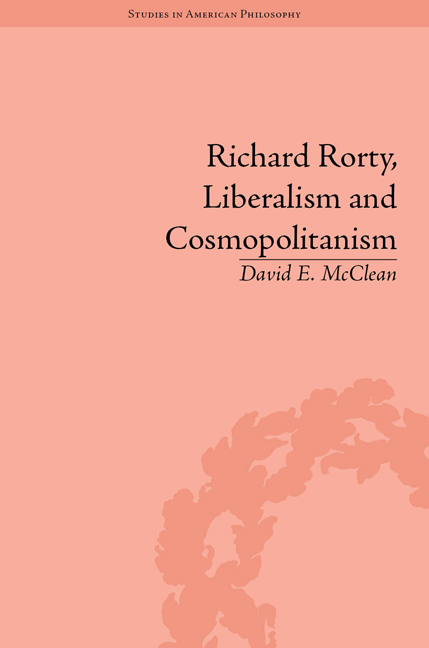Book contents
- Frontmatter
- CONTENTS
- Dedication
- Key to Works by Rorty
- Preface: Rorty's ‘Violence of Direction’
- 1 From Pragmatism to Rortyism
- 2 Alternative Utopias
- 3 Why Rorty Matters
- 4 Rorty on Religion, Race, Culture and Politics
- 5 Rorty and Cosmopolitanism
- Epilogue: Looking Forward to the Year 2096 with Cosmopolitan Hope
- Works Cited
- Notes
- Index
4 - Rorty on Religion, Race, Culture and Politics
- Frontmatter
- CONTENTS
- Dedication
- Key to Works by Rorty
- Preface: Rorty's ‘Violence of Direction’
- 1 From Pragmatism to Rortyism
- 2 Alternative Utopias
- 3 Why Rorty Matters
- 4 Rorty on Religion, Race, Culture and Politics
- 5 Rorty and Cosmopolitanism
- Epilogue: Looking Forward to the Year 2096 with Cosmopolitan Hope
- Works Cited
- Notes
- Index
Summary
Before we can enter more fully into a discussion of Rorty and cosmopolitanism, some additional discussion of Rorty's views on religion, race, culture and politics might be helpful. On the subject of religion, Rorty evolved in his thinking, away from the notion that religion is simply a ‘conversation stopper’ to what he described as more proper appellations for his thoughts on religion. That is, penultimately, Rorty came to express his concerns and misgivings regarding religion under the general appellation ‘anti-clerical’, which encompassed what he called an ‘anti-ecclesiastical’ view, where ‘anti-ecclesiastical’ refers to a stance against ‘organizations that accredit pastors and claim to offer authoritative guidance to believers’. Rorty's grappling with religion and its place in any liberal, democratic and pluralistic order is quite interesting to observe, even where his conclusions seem forced and are unpersuasive. In my view, much of what Rorty (that is, the early Rorty) wrote concerning religion, and especially the legitimacy of religion's participation in public policy debates, was deeply flawed. While he evolved in his views (or as he put it, was forced to start ‘back-pedaling’), even his later views on religion were problematic because based upon a very thin conceptualization of religion, sets of practices and beliefs that are multifaceted and richly variegated. Yet, ultimately, he came to accept that religion would remain part of ‘the conversation of mankind’ and might so remain even in his Pragmatist utopia.
On race, Rorty may be viewed, tenably, as a deflationist, if not a racial eliminativist.
- Type
- Chapter
- Information
- Richard Rorty, Liberalism and Cosmopolitanism , pp. 111 - 136Publisher: Pickering & ChattoFirst published in: 2014

